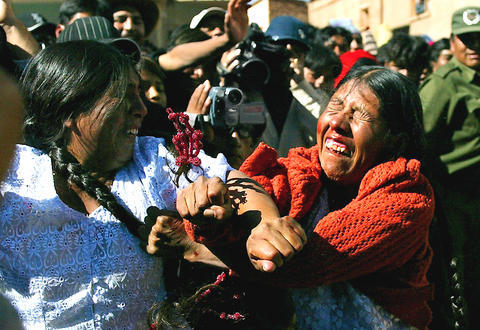The locals come down from the mountains drunk, dancing and ready to fight. The police come to make sure no one dies. And the tourists, reporters and documentary filmmakers come for the blood.
The outside world has discovered "Tinku," or "encounter" in Quechua, an ancient ritual in which indigenous Quechua communities gather each year in a remote corner of the Bolivian Andes to dance, sing and settle old scores in staggering street fights.
The largest Tinku takes place early each May in Macha, 340km southeast of La Paz, where this year's festival provided a stunning and sometimes uneasy combination of culture, spectacle and violence.

PHOTO: AP
Relatively unknown outside the Andes for centuries, Tinku remains on the fringe of Bolivia's growing tourism industry.
But its heavily asterisked listing in the guidebooks -- Lonely Planet calls it "a violent and often grisly spectacle" -- is beginning to draw both backpackers and members of the media curious to witness the peculiar event firsthand.
The attention has not gone unnoticed by the locals in Macha, a bitterly poor village of adobe houses and narrow dirt streets tucked between cold, dusty hills some 4,000m above sea level.
Tinku fighters generally resent the foreigners' gaze and now ask for money to have their picture taken.
When drunk enough, a fighter may take an occasional swing at anyone in the street carrying a camera.
Tinku is a pre-Colombian tradition meant to solve conflicts and release tensions within the local community while honoring the Andean earth goddess Pachamama. Participants believe the spilt blood brings fertility to the rocky soil, and the death of a fighter forecasts an especially abundant harvest the following year.
The challenge for Macha city officials is to promote Tinku's authentic heritage while preventing the spotlight from turning its sacred rituals into meaningless blood sport.
"Before, Tinku was something shared," said Abelardo Colque, who was selling press passes in Macha's one-room city hall.
"They didn't just fight; they fought and ended up shaking hands. But now it's turning into just fighting without any point," he said.
The festival includes several days of ceremonies blurred together by sleepless and spirited binges on grain alcohol and chicha, a tart homemade corn beer. There are prayers to a Christian crucifix, llama sacrifices at dawn, and an endless stomping, shuffling dance to the eerie strains of cane flutes and rhythmic, two-chord songs beat out on mandolin-like charangos.
On its climactic day, May 4 this year, fighters marched down the hill into town -- still dancing, still singing -- with their eyes peeled for particular rivals, intent on resolving everything from love triangles to land disputes.
While most fights are short-lived, death is not uncommon -- one person was killed at a smaller Tinku in Macha in February.
But with more foreigners turning up each year, local officials have brought in extra police to reduce the violence, and even broadcast radio announcements asking revelers not to attack street vendors.

Philippine President Ferdinand Marcos Jr has fired his national police chief, who gained attention for leading the separate arrests of former Philippine president Rodrigo Duterte on orders of the International Criminal Court and televangelist Apollo Carreon Quiboloy, who is on the FBI’s most-wanted list for alleged child sex trafficking. Philippine Executive Secretary Lucas Bersamin did not cite a reason for the removal of General Nicolas Torre as head of the 232,000-member national police force, a position he was appointed to by Marcos in May and which he would have held until 2027. He was replaced by another senior police general, Jose

STILL AFLOAT: Satellite images show that a Chinese ship damaged in a collision earlier this month was under repair on Hainan, but Beijing has not commented on the incident Australia, Canada and the Philippines on Wednesday deployed three warships and aircraft for drills against simulated aerial threats off a disputed South China Sea shoal where Chinese forces have used risky maneuvers to try to drive away Manila’s aircraft and ships. The Philippine military said the naval drills east of Scarborough Shoal (Huangyan Island, 黃岩島) were concluded safely, and it did not mention any encounter with China’s coast guard, navy or suspected militia ships, which have been closely guarding the uninhabited fishing atoll off northwestern Philippines for years. Chinese officials did not immediately issue any comment on the naval drills, but they

POWER CONFLICT: The US president threatened to deploy National Guards in Baltimore. US media reports said he is also planning to station troops in Chicago US President Donald Trump on Sunday threatened to deploy National Guard troops to yet another Democratic stronghold, the Maryland city of Baltimore, as he seeks to expand his crackdown on crime and immigration. The Republican’s latest online rant about an “out of control, crime-ridden” city comes as Democratic state leaders — including Maryland Governor Wes Moore — line up to berate Trump on a high-profile political stage. Trump this month deployed the National Guard to the streets of Washington, in a widely criticized show of force the president said amounts to a federal takeover of US capital policing. The Guard began carrying

Ukrainian drone attacks overnight on several Russian power and energy facilities forced capacity reduction at the Kursk Nuclear Power Plant and set a fuel export terminal in Ust-Luga on fire, Russian officials said yesterday. A drone attack on the Kursk nuclear plant, not far from the border with Ukraine, damaged an auxiliary transformer and led to 50 percent reduction in the operating capacity at unit three of the plant, the plant’s press service said. There were no injuries and a fire sparked by the attack was promptly extinguished, the plant said. Radiation levels at the site and in the surrounding